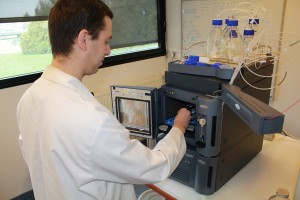Main research topics
Protection of the environment
… but also protection of the people, reduce the environmental impact of human activities by treating the industrial, agricultural or urban wastes (water, air, soils, …), eliminate refractory compounds in liquid effluents by one or coupled processes, lower the release of VOC, odors … in gaseous effluents. Resolve soil contamination by persistent organic products (POP). Limit population’s exposure to residual pollutants in water (pesticides, endocrine disruptors, pharmaceutical residues …) or air (odors, work or residential environments…)
Micropollutant analysis 
Develop identification and quantification methods for trace level organic compounds in complex media. Study their fate in the environment and during treatments. Identify and quantify treatment by-products.
Air/Water/Soil treatment processes
Develop new processes and design combined treatments. Study reactions mechanisms for chemical and biological oxidation. Examine the physical-chemical and biological phenomena governing these processes. Model their behavior and built simulation tools. Upscaling concepts to real industrial conditions.
Cosmochemistry
Synthezise new molecules based on hetero-elements occurring in interstellar medium and model the reaction in those conditions.


